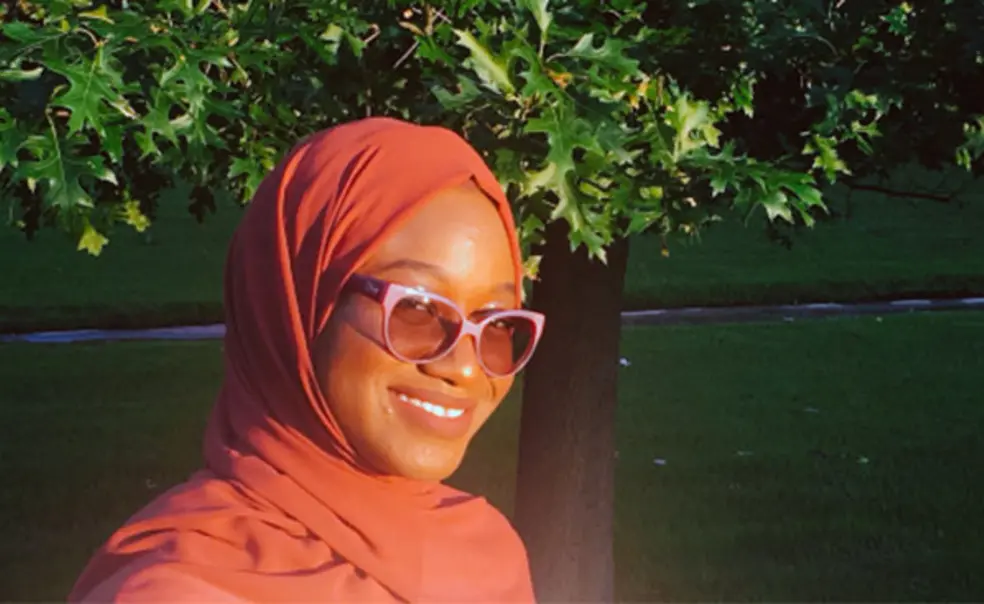Podcast Spotlight: Amina Olajide ’15 Shares Mentorship Conversations, Revealing Factors Behind Success
Although Amina Olajide ’15 graduated with a degree in molecular biology, her lifelong dream was to become a writer or journalist. She found her way into the podcast world after graduation, when she started asking questions about the lack of transparency in spaces like higher education. That inquiry led to Skiveo, a mentorship program meant to connect “insiders” in advanced fields with incoming students. Skiveo Radio is a podcast that shares Olajide’s conversations about diversity and inclusion with coders, academics, lawyers, and engineers.
On the origins of Skiveo
“My [first-year Community Action] Leader — who actually went on to Harvard Law — told us a story where her professor said that her paper deserved a certain grade, but that because of the grade deflation policy, he could only give her a lower grade. That stuck with me. When my sister was applying to college, I was thinking about how the process is not as transparent as I would like it to be… . I wanted to create a platform not to expose the school but to provide more information from people who have been on the other side to people who have yet to exist as students.
“A year after starting Skiveo as a mentorship platform where I connect prospective students so they can gain more information about the process, I thought: ‘Let me create a literal audio platform where you can hear conversations between myself and other people from higher education and companies who can share their lessons learned.’”
THE PLAYLIST
Three more podcasts to check out this month
1. Author and copyright expert BILL ROSENBLATT ’83 explains why “music is where the action is” in copyright law on Beyond the Book.
2. Wharton School professor KATY MILKMAN ’04 speaks with Nobel laureate and Princeton professor emeritus DANIEL KAHNEMAN about risk and the “reflection effect” on Choiceology.
3. Former CBO Director DOUGLAS HOLTZ-EAKIN *85 discusses recent economic data on Bloomberg Best.
Being an introvert
“Even I think it’s strange that I decided to start a podcast. Not because I don’t love conversation — I do love learning from people — but at the end of the day I think I derive a lot of energy from solitude. It was a risk for me to do this in that I knew that it would mean putting myself out there in terms of social interaction. It’s been a very fruitful and rewarding process. But I would never have imagined that I would do this.”
Ambitions for Skiveo Radio
“I want to pull back the curtain on privilege. I want the audience to see behind it, because I think some people look at me, or people who are the second-highest level engineer at Tesla … and they say, ‘My life isn’t like that, that’s not fair, how come I’m not in that position, how come I didn’t get so lucky?’ etc. But the thing is, when you listen to the conversations that I had with these people, you realize that they’re almost identical to you. For some people, this idea of the meritocracy has stuck too much with them — and yes, let’s not be self-effacing, these people’s individual efforts got them to where they are — but there are factors that [many of us] don’t see that play into how these people got to where they are.
“Recently I interviewed a Rhodes scholar who said, she just ‘shot her shot,’ she took her chance, she applied for the Rhodes scholarship and she never imagined that she was qualified for it. And so many factors went into her getting support for the application: She never imagined that she would get into Penn, she was an international student from Malaysia, etc. For people to look at her and be jealous or envious is sort of strange, because they’re not seeing the multiplicity of factors behind her success.”
A matter of perspective
“Before this podcast, my understanding of these issues and my relationship to these issues was very different. I’ve spoken to people who’ve expressed to me that they had anxiety, but then they end up at Harvard Law and then they’re working as a judicial clerk for the 9th Circuit Court of Appeals. You know, people who are at Harvard, who are at Facebook or Tesla, expressing these various issues about anxiety or undermining themselves.
“In past conversations with people in these positions of power, to hear them say they’ve had troubles with anxiety, and to hear their response to it, to hear how they analyze the situation, how they’ve interpreted it, gave me a clear vision for [myself] on how to change my perspective. Because I think at the end of the day, the situation may not change, but if you can change the way you look at it, you can change the situation.”
Interview conducted and condensed by Peter Schmidt ’20
Alumni, if you have a podcast that you’d like to share with PAW readers, please email us at paw@princeton.edu.












No responses yet